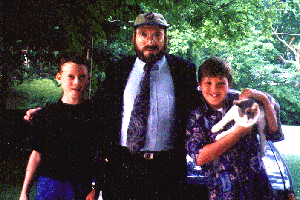| David M. Manuta, Ph.D., FAIC 431 Gordon Avenue Personal Philosophy My personal motto is that, “There is nothing automatic in this world.” In my work with young people, I try to demonstrate by example what one can achieve by working both harder and smarter. No one is going to be handed success on a silver platter. Success is earned over what can be a considerable period of time. This is not only important while one is still in school, but it is also important in establishing oneself as a quality human being. A professor of mine in graduate school summed it up when he told me, “Once your name is on the document, it must be representative of your best effort.”
In addition, it is important to learn from the experiences of other people. Try as hard as I might, I don’t know everything! Listening to the advice and the expertise of other people is part of the process of continuous education and growth. This advice and/or expertise is often objective and it is useful in decision making. I make what I consider to be my most informed decisions after receiving feedback and input from the cadre of people that I trust on a particular issue. People want to share what they know. It is not a sign of weakness for one to say, “I don’t know” or to ask for help. Rather, it is an acknowledgment that we must depend on each other in order to survive. I have applied these principles when I was in a minor auto accident with an elderly gentleman. Although, I can admire him for his life’s achievements (World War II veteran, successful businessman, a second home in Florida, etc.), these accomplishments do not constitute a “free pass” and enable him to “get away” with something that he had done. I felt that to have let this fellow “get away with it” would have been an unacceptable compromise of my principles, and it would have made the wrong impression on the youngsters with whom I have been working. Recently, I had this situation arise at the local McDonald’s restaurant. There was a puny piece of chicken in my sandwich. What a strange thing to bite into the sandwich and get nothing but bread! The young woman behind the counter was too young to remember the old tv commercials about “Where’s the beef?” In this case, where’s the chicken was answered by politely telling the young woman that the sandwich was unacceptable. She was apologetic, and a few minutes later she brought a more appropriately sized sandwich to the table. My Little Brother, Clyde, watched this scene with amusement! INDEX | MANUTA CHEMICAL CONSULTING | RUTH MANUTA FOUNDATION | PERSONAL For more information contact mc2@dmanuta.com |
 We also must make a conscious effort to do what we say and say what we do. This leads to consistency. Consistency may seem boring, but it is reassuring when you and others know how you or they are likely to react to something. Trust emerges as a result of being consistent in your dealing with people. (It is reassuring when someone tells you that you can be counted on to deliver!) Nothing is more important than to be trusted by other people or that we can trust them. Business gets done when people have reasonable expectations of one another. (Wouldn’t it be nice if all business could be done via a handshake!) Communicating expectations clearly to one another is another ingredient of success!
We also must make a conscious effort to do what we say and say what we do. This leads to consistency. Consistency may seem boring, but it is reassuring when you and others know how you or they are likely to react to something. Trust emerges as a result of being consistent in your dealing with people. (It is reassuring when someone tells you that you can be counted on to deliver!) Nothing is more important than to be trusted by other people or that we can trust them. Business gets done when people have reasonable expectations of one another. (Wouldn’t it be nice if all business could be done via a handshake!) Communicating expectations clearly to one another is another ingredient of success!